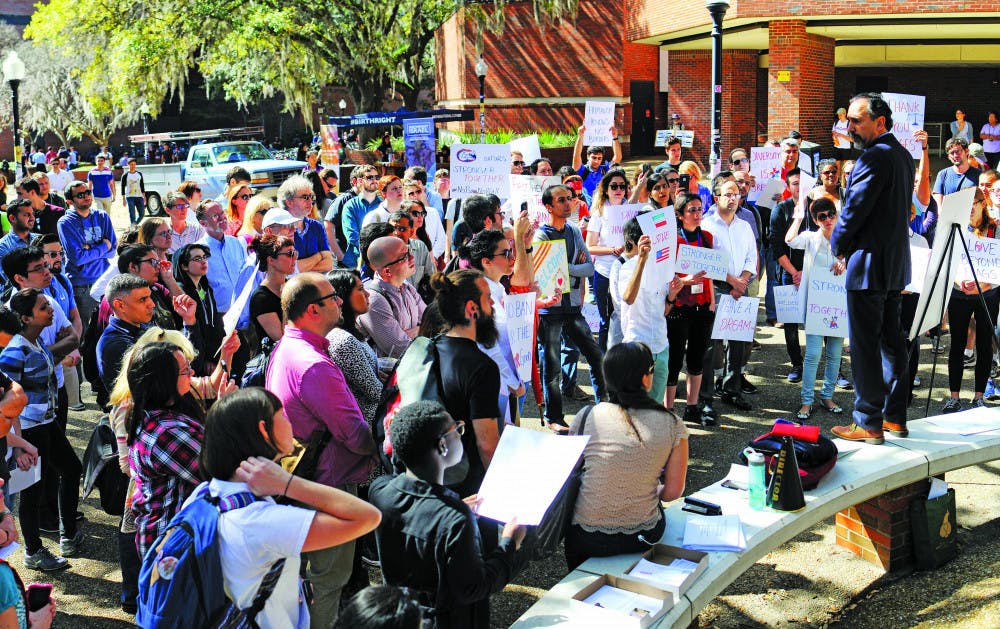Farimah Farahmandi has woken up every morning for the past two weeks wishing what happened was a bad dream.
“All of my hopes and dreams were faded with just one signature,” said the UF computer science doctoral student.
Farahmandi, 28, and two other doctoral students organized a protest Thursday on Turlington Plaza against the signature: President Donald Trump’s on an executive order that attempted to halt travel to the U.S. from seven Muslim-majority countries.
About 50 people attended the protest, held as part of a series across the nation called Academics United - No to Visa and Immigration Ban. Scholars from more than 40 American universities protested the ban simultaneously.
Guita Banan, a UF physics doctoral student from Iran, a country affected by the travel freeze, said she thinks the ban will halt scientific developments in the U.S. because international scientists won’t feel welcome.
“No scientist would want to live in a situation like this, where you could wake up one morning and find everything that you worked for so hard just gone,” said the 29-year-old, who helped organize the protest.
Farahmandi, who is also from Iran, said she doesn’t know if she’ll be able to stay in the country after graduating in Fall.
“I didn’t do anything wrong,” she said. “I wrote articles. I wrote book chapters. I studied. I did research.”
Mary Kay Carodine, UF’s assistant vice president for Student Affairs, told students the university will do everything it is legally allowed to do to support them.
“We are committed to provide care and justice and serve you in whatever ways,” she said. “We’ll try to be as creative as possible to do that.”
Steve Arroyo, a 23-year-old UF history senior, said the protest was misguided.
“This is purposeless,” he said. “This is a bunch of people trying to show each other how good, how virtuous they are.”
Arroyo said he believes the travel ban was a good idea but disagreed with how it was implemented.
People with green cards should not have been prevented from entering the U.S., he said.
But for Ela Sajjadi, a UF rehabilitation science doctoral student, the ban is personal.
“I am not optimistic about this anymore,” said Sajjadi, who’s from Iran.
The 30-year-old said her mother and sister are back at home in Iran.
She wanted to go see them this summer and later apply for a job in the U.S., but now she doesn’t know if either will happen.
“It’s very difficult because you have a plan on the back of your head, and then you’re affected by a law,” Sajjadi said. “You just don’t know what to do.”
@taveljimena
jtavel@alligator.org
Leonardo A. Villalón, the UF International Center dean and an African studies professor, speaks at the Academics United - No to Visa and Immigration Ban protest. He encouraged students to keep demonstrating their discontent toward the ban and to engage in arguments with others using facts and statistics. "The university cares and is fighting on your behalf," Villalón said.
A person holds up a scarf during the rally today. Nicole Acosta, a 21-year old psychology junior, supported the protest against Trump’s immigration ban. "I worry that this is the first step towards normalizing fascism and racism, and picking and choosing who we want in this country, and that's not right," she said.
Ehsan Fereyduni, UF graduate student in chemistry holds a sign that states (image-wise) Iran loves U.S.A. Ehsan expressed his concerns how the ban also includes educated people who come to the United States of America. More than 100 people attended the event Academics United-No to Visa and Immigration Ban.






